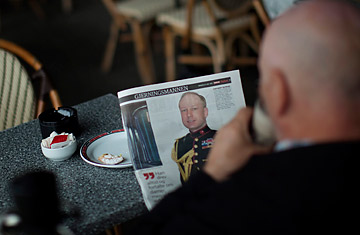
A man sitting in an Oslo café on July 27, 2011, reads a newspaper report featuring a photo of Anders Behring Breivik, the suspect of Norway's twin terror attacks
(2 of 3)
Sticks and Stones, and Words That Hurt
The unnamed young man is angry, and he's trying to explain why. "The Muslamic infidel, they're trying to get their law over our country. It's happening in other countries. It's happening in every country. You've got Iraqi law that they've put down in London ... We can't stand for that," he explains in a segment, filmed, in an irony he is unlikely to have recognized, by Iran's English-language broadcaster Press TV, during an EDL demonstration last February in Luton, 30 miles (50 km) north of London. Behind him, shaven-headed demonstrators unfurl the English flag, the Cross of St. George. Which Iraqi law is this? the interviewer asks. "It's the Muslamic law," the young man replies. "They've got their law ... You're got Muslamic rape gangs. There are 15-year-olds getting raped and everything."
The British far right has long accused Asian men of targeting white women for sexual abuse. In January, two Asian men in the English Midlands city of Derby were jailed for abusing white girls. The judge said race was not a factor, but Jack Straw, a former Labour Cabinet Minister and member of Parliament for a constituency with a large Muslim population, gave an interview to the BBC in which he suggested otherwise. "These young men are in a Western society, in any event, they act like any other young men, they're fizzing and popping with testosterone, they want some outlet for that. But Pakistani heritage girls are off-limits, and they are expected to marry a Pakistani girl from Pakistan, typically," he said. "So they then seek other avenues, and they see these young women, white girls who are vulnerable, some of them in care ... who they think are easy meat."
Straw's comments drew fire from political moderates and crows of delight from the far right, whose eternal litany of being demonized for daring to speak the truth appeared to have been given legitimacy. Straw's intervention was intended to highlight a deeply serious and comparatively small-scale problem, but instead it risked labeling all young Asian men as sexual aggressors. The controversy highlighted the conundrum facing mainstream Western politicians: how to talk about the real stresses and imagined strains that have come with rising immigration and the multicultural conurbations that emerge without exacerbating those stresses and strains. As poorer indigenous populations have found themselves competing with incomers for jobs, housing and social support, and with birth rates typically higher among immigrants, the far right has played on fears of an enemy within. Since Sept. 11, 2001, and the subsequent percussive wave of al-Qaeda-inspired terrorist attacks in Europe, anxieties — and hostilities — have centered increasingly on Muslim communities.
Small disorganized far-right groups, without democratic ambition and often operating below the radar of security services, are dotted across the world, sometimes converging at rallies, festivals and concerts, and communicating in Internet chat rooms and online forums. The EDL claims two sister "defense leagues" in Scandinavia, one in Scotland and another in the U.S. Breivik described himself as a member of another group, the Knights Templar, that may or may not prove a figment of his imagination.
Chivalric and military imagery is popular on the far right. Jobbik, now the third largest party in the Hungarian parliament, used to appear at rallies accompanied by the Magyar Garda, or the Hungarian Guard, a private militia that was co-founded by Jobbik leader Gabor Vona, officially disbanded by court order in 2009 and later controversially reconstituted as the Magyar Garda Foundation. But Islamophobia has also fueled the rise of professionalized anti-immigration parties in Scandinavia and elsewhere that look just like their more moderate rivals. Some, such as Norway's Progress Party (which Breivik once supported), Wilders' PVV in the Netherlands and the Lega Nord in Italy, have attained considerable political power. Others may be on the verge of electoral breakthroughs — polls suggest that Marine Le Pen, the personable leader of France's National Front, could beat the incumbent Nicolas Sarkozy in the first round of voting for the presidency next year.
Le Pen's opponents may take comfort that the history of such populist parties is littered with tales of defeats seized from the jaws of victory. The British National Party (BNP) made substantial gains over a four-year period peaking in 2009 when it won two seats in the European Parliament and gained a million votes across the U.K., but with increasing prominence came increasing scrutiny. Its leader, Nick Griffin, performed poorly in debates, and internal splits and financial woes have reduced the BNP to comedic chaos.
Its brief period in the sun galvanized bigger parties. Some chose to confront the BNP and challenge the prejudices and distortions it propagates. (Here's a concocted statistic, typical of BNP propaganda, from TIME's 2009 interview with Griffin: "The average racist murderer [in Britain] is 40 times more likely to be a member of an ethnic minority than the other way round.") But many were tempted into invading the BNP's own turf, sounding strident notes on the hot-button topics driving the BNP's recruitment.
